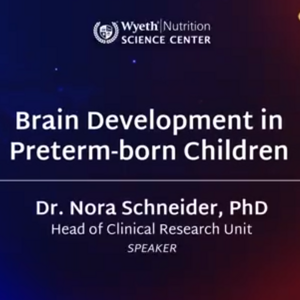Preterm Birth
Filters
- Article
- Video

Brain Development in Preterm-born Children
Dr. Nora Schneider
![[Literature Library] Risk factors for preterm birth](/sites/default/files/styles/card_m_mobile/public/2021-08/016_Baby%27s-feet-opt.jpg?itok=21tqo7EE)
[Literature Library] Risk factors for preterm birth

Maternal DHA supplementation and early preterm birth
![[Literature Library] Maternal protein status and risk of preterm birth](/sites/default/files/styles/card_m_mobile/public/2021-05/226_Plant%20protein.jpg?itok=d4C1ryUn)
[Literature Library] Maternal protein status and risk of preterm birth

Higher DHA Intake on Birth & Maternal Outcomes: Practical Pearls from Dr Susan Carlson

[Science Updates] Cesarean delivery and risk of preterm birth

Expert discussion on World Prematurity Day 2020 – Preterm brain development and executive functions by Prof. Nick Embleton

Infographic – Risk Factors Associated with Preterm Birth

[Literature Library] Omega-3 fatty acids and preterm birth
![[Literature Library] A review of the current evidence on nutritional and bioactive solutions for preterm birth risk reduction](/sites/default/files/styles/card_m_mobile/public/2019-12/016_Baby%27s-feet-opt.jpg?itok=5TirZBFz)
[Literature Library] A review of the current evidence on nutritional and bioactive solutions for preterm birth risk reduction
![[Hot Science] Breastmilk exposure and its association with brain development and connectivity in preterm infants](/sites/default/files/styles/card_m_mobile/public/2019-07/nutrition-and-the-developing-brain.jpg?itok=NR4FxdVg)
[Hot Science] Breastmilk exposure and its association with brain development and connectivity in preterm infants

AAP Guidance on Calcium and Vitamin D Requirements of Preterm Infants
![[Hot Science] Maternal omega-3 fatty acid status and early preterm birth](/sites/default/files/styles/card_m_mobile/public/2019-11/image6_2.jpg?itok=GgnFKUvZ)
[Hot Science] Maternal omega-3 fatty acid status and early preterm birth

Relationship between maternal vitamin D status and preterm birth

[Literature Library] Women providing milk to preterm infants and DHA supplementation

Maternal intake of seafood and omega-3 fatty acids and preterm birth